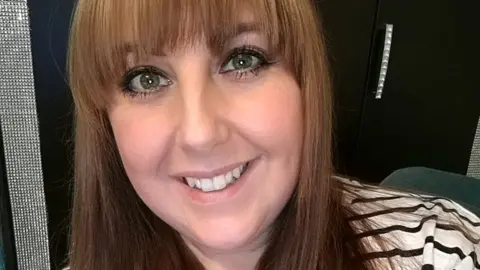Depression: 'I kept my head down to survive the day at work'
 Time to Change
Time to Change"I'd sit at my desk and not be able to stop the tears rolling down my face.
"A few people said, 'Are you all right, do you need to be here?' but no-one was really that interested."
For Natalie Hall, 36, the fear that she might lose her job or not be trusted in her day-to-day judgements was a barrier to talking openly to colleagues about her depression and anxiety disorder.
But this may not be uncommon as a survey suggests mental health problems remain a taboo in the workplace.
The poll of 2,025 UK workers by the charity Time to Change found they would rather talk to colleagues about sex or money worries than a mental health issue.
Brave face
When asked to select from a list the issues they felt they could talk openly about at work, 36% said they would open up about a physical health matter, 26% about money problems and 18% about sex - while just 13% selected mental health illness.
However, 58% said they would encourage a colleague to open up to them, or someone else at work, if they noticed he or she was struggling with their mental health and 16% said they would raise the matter with a line manager.
For Natalie, an intelligence analyst for Northumbria Police, putting on a brave face about the state of her mental health seemed the logical thing to do.
"At work I tried to carry on because I didn't want to give up, I didn't want to be defeated and I was ashamed as well because it wasn't talked about.
"I was really worried that if I said, 'I've got depression and anxiety,' that would affect my career and my job prospects for the future.
"And, you know, would I lose my job? Would I be seen as incapable? That the judgements I make aren't rational any more, that my work wasn't trusted and that I'd be sidelined for things?"
Eventually Natalie's mental health deteriorated to such an extent that she sought medical help from a new doctor and was signed off sick.
Now back in the office, thanks in part to a phased return to work and a supportive line manager, Natalie says colleagues just didn't know what to say.
"Don't get me wrong, I did have support and there were some supportive colleagues, but nobody really knows what to say and how to help.
"At that point I hadn't told anybody because I was still too ashamed to say it, I felt a massive failure and so I just retreated, I was no longer really bubbly and involved in the office, I very much kept my head down, stayed hidden behind a computer screen to just survive the day at work."
Simple gestures
But she says small gestures can go a long way to help a colleague who's suffering with a mental health issue.
"It's simple things - 'I'll make you a cup of tea', 'Shall we go and have a little walk?' 'Shall we get out of the office and go for a coffee?'
"And it's about someone giving up a bit of their time, not saying, 'I can make it better,' but just being there and that's what makes the difference.
"Definitely, when I was on the sick, it was those little thinking-of-you cards and the bunch of flowers that arrived in the post - those were the things that I hung on to and kept going for.
"It doesn't have to be a big project or anything, it's just taking the time to say, 'Are you all right?' and not just walk away - it's taking the time out to actually sit down and speak to people.
"In the workplace, we spend so much time at work, but do we really know what's going on in each other's lives?"
